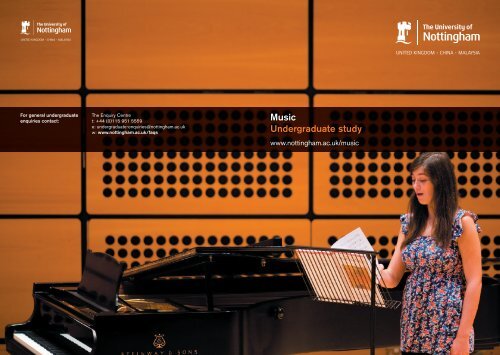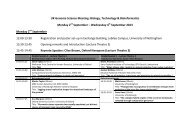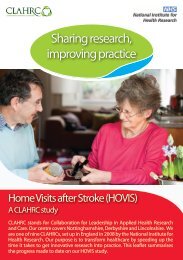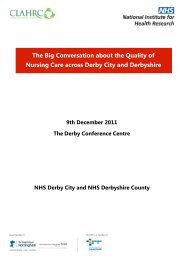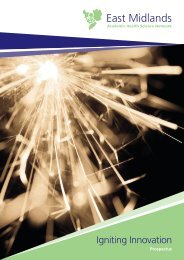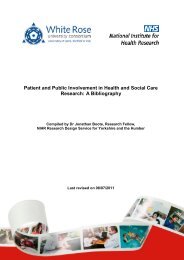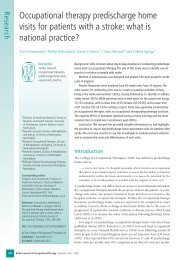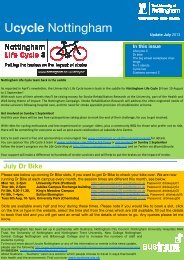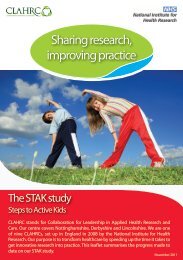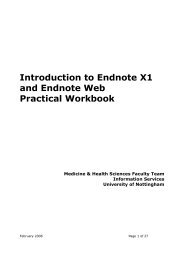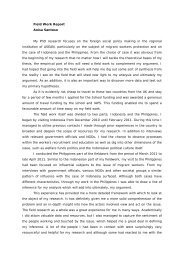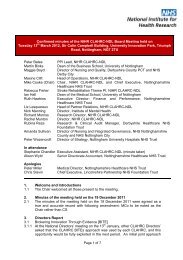Undergraduate Music Brochure PDF - University of Nottingham
Undergraduate Music Brochure PDF - University of Nottingham
Undergraduate Music Brochure PDF - University of Nottingham
- No tags were found...
Create successful ePaper yourself
Turn your PDF publications into a flip-book with our unique Google optimized e-Paper software.
For general undergraduateenquiries contact:The Enquiry Centret: +44 (0)115 951 5559e: undergraduate-enquiries@nottingham.ac.ukw: www.nottingham.ac.uk/faqs<strong>Music</strong><strong>Undergraduate</strong> studywww.nottingham.ac.uk/music
Department <strong>of</strong> <strong>Music</strong>www.nottingham.ac.uk/musicDepartment <strong>of</strong> <strong>Music</strong>www.nottingham.ac.uk/musicContentsWelcome to theDepartment <strong>of</strong> <strong>Music</strong>02 Welcome03 Why choose The <strong>University</strong> <strong>of</strong> <strong>Nottingham</strong>?06 Why music at <strong>Nottingham</strong>?07 <strong>Music</strong> degree courses13 How will I study?15 Careers17 Student pr<strong>of</strong>ile20 Applying for a place25 Frequently asked questions26 Visiting and contacting usFront cover image:Opera singer Jade is practising in the Djanogly Recital Hall in the Department <strong>of</strong> <strong>Music</strong>.Thank you for your interest in studying musicat The <strong>University</strong> <strong>of</strong> <strong>Nottingham</strong>. This brochureis designed to provide you with informationon the Department <strong>of</strong> <strong>Music</strong> and the courseswe <strong>of</strong>fer.We have tried to answer some <strong>of</strong> your questionson what and how we teach, what we look for inan applicant, and what it’s like to be a studenthere. We’ve also included information on careeropportunities that will be open to you when youhave completed your degree course.Our students have the opportunity to workwith scholars who are leaders in their fields,and to gain experience <strong>of</strong> direct value to a range<strong>of</strong> career paths, both within and beyond themusical world.We are a forward-looking and diverse creativecommunity, and welcome anyone seeking todeepen their understanding <strong>of</strong> music in all itspractical, historical and theoretical forms. If wehave not answered all your questions in thisbrochure, please contact us using the details onpage 26 or visit our website:www.nottingham.ac.uk/musicGood luck with your studies and your applications,wherever you choose to study.Dr Sarah HibberdAssociate Pr<strong>of</strong>essor and Head <strong>of</strong> theDepartment <strong>of</strong> <strong>Music</strong>Students in the food court in the PortlandBuilding on <strong>University</strong> Park Campus.0102
Department <strong>of</strong> <strong>Music</strong>www.nottingham.ac.uk/musicDepartment <strong>of</strong> <strong>Music</strong>www.nottingham.ac.uk/musicWhy choose The <strong>University</strong><strong>of</strong> <strong>Nottingham</strong>?There are a lot <strong>of</strong> factors to consider whenapplying to university and some will be moreimportant to you than others. We’re proud thatthousands <strong>of</strong> students apply to us every year– below are some <strong>of</strong> the reasons they give forchoosing us.An inspiring environment...A commitment to academic excellence driveseverything we do and has earned us internationalrecognition. It is evident in our teaching and ourresearch: in independent teaching assessments,39 <strong>of</strong> our subjects (including music) wereawarded “excellent” ratings <strong>of</strong> between 22 and24 out <strong>of</strong> 24. Our scores in the latest ResearchAssessment Exercise rank <strong>Nottingham</strong> seventhin the UK in terms <strong>of</strong> “research power” and in2010, we were runner-up for the Sunday Times<strong>University</strong> <strong>of</strong> the Year award.…with great career prospectsOur high standards mean that a <strong>University</strong> <strong>of</strong><strong>Nottingham</strong> degree is respected by both UK andforeign employers and the employment record <strong>of</strong>our graduates is one <strong>of</strong> the best in the country.If you want to improve your career prospectsfurther, you can speak to experts in our Careersand Employability Service, gain recognition foryour extracurricular achievements through the<strong>Nottingham</strong> Advantage Award or set up your ownbusiness with the help <strong>of</strong> our EnterpriseLab.…not-to-be-missed opportunitiesOutside <strong>of</strong> lectures, the opportunities at<strong>Nottingham</strong> are numerous and varied. All ourcampuses have a strong community spirit and ourStudents’ Union (SU) <strong>of</strong>fers over 250 societiesand sports clubs. It’s through them that you canpursue an existing interest or take up somethingnew with like-minded people, develop valuableskills and generally make your time at university asrewarding and memorable as possible.As a music student, you may claim free tickets forthe regular pr<strong>of</strong>essional concerts presented by the<strong>University</strong>’s Lakeside Arts Centre.…access to a dynamic cityThe city <strong>of</strong> <strong>Nottingham</strong> is another rich source<strong>of</strong> entertainment. Its attractions include bars,boutiques, the Capital FM Arena, shoppingcentres, an arboretum, pubs, theatres, an iceskating rink, cafes, markets, mainstream andindependent cinemas, two pr<strong>of</strong>essional footballclubs, nightclubs and a climbing centre. <strong>Music</strong>students can buy cheap tickets for the superbinternational orchestral series at the Royal ConcertHall, and for the regular productions by OperaNorth at the Theatre Royal.…and options for exploring the worldIf you’re hoping to broaden your horizons furtherwhile at university, we have the connections tohelp you experience new cultures first-hand. Aswell as exchange opportunities at our campusesin China and Malaysia we have developed linkswith more than 320 partner universities in over40 countries.We hope this information has given you an insightinto life at <strong>Nottingham</strong> and why so many studentschoose to study here. The next step is to bookonto one <strong>of</strong> our open days, which take place inJune and September. Attracting 35,000 visitorsannually, these events are an opportunity toexplore our campuses, chat to staff and currentstudents and most importantly, get a feel forwhether you will be happy here. To book yourplace, please seewww.nottingham.ac.uk/opendaysWe look forward to showing you around.For a copy <strong>of</strong> our City Guide, contact the EnquiryCentre using the details on the back page.“Pr<strong>of</strong>essional international musicians playhere on a weekly basis and even the beautifulcampus itself seems to make me thinkmore clearly.”<strong>Music</strong> studentStudents relax on <strong>University</strong> Park Campus, abeautiful green campus with period buildingsand a large boating lake.0304
Department <strong>of</strong> <strong>Music</strong>www.nottingham.ac.uk/musicDepartment <strong>of</strong> <strong>Music</strong>www.nottingham.ac.uk/musicA music student playing the flute in theDepartment <strong>of</strong> <strong>Music</strong>’s recital hall.Why music at <strong>Nottingham</strong>?05The Department <strong>of</strong> <strong>Music</strong> <strong>of</strong>fers exceptionalteaching by world-leading scholars, anunparalleled on-campus music scene,inspiring rehearsal and performance facilities,and a programme <strong>of</strong> music internships andcareers training. Our wide-ranging and flexibleundergraduate courses permit both focus andbreadth <strong>of</strong> study, and allow students maximumfreedom in their combination <strong>of</strong> modules.Studying music will enable you to develop skillsfor a range <strong>of</strong> future career paths. Composersand performers can pursue dedicated pathwaysthroughout the three years <strong>of</strong> their course,developing the practical expertise gained in theirspecialist tuition with complementary modulesexamining (for instance) different periods inmusical history, early music notation, analyticalskills, and sound technology and recording.Students interested in careers in education and artsadministration can take innovative modules in (forinstance) music and ethics, music and cities, andcommunity music programmes. There is plenty <strong>of</strong>room to experiment with different subjects, allowingyour own interests to develop and mature as yougo along.All music students will graduate with an enviablearray <strong>of</strong> highly developed skills adaptable to anywork environment, including skills in researchand data analysis, public presentation, projectmanagement, teamwork, communication and IT.The department is housed in modern purpose-builtaccommodation overlooking the boating lake on<strong>University</strong> Park Campus. Facilities include an on-sitespecialist music library (including listening booths,a large collection <strong>of</strong> sound recordings and a videoand DVD archive), a computer laboratory and arecording studio, 15 purpose-built practice rooms,a lecture theatre, an orchestral-size rehearsal hall,and the Djanogly Recital Hall, where pr<strong>of</strong>essionaland student concerts are presented throughout theyear. The department owns a varied collection <strong>of</strong>orchestral and early instruments.Group coaching and/or tuition is available onsome <strong>of</strong> these instruments.Study abroadAll students may apply to spend a semesterabroad in countries including Australia, Canada,China, Ireland, Japan, Korea, Mexico, NewZealand, Singapore, Sweden and the US.Diverse communityWe are a friendly and diverse group <strong>of</strong>musicians and academics, with a strong sense<strong>of</strong> departmental identity. We currently haveapproximately 150 undergraduate students from awide range <strong>of</strong> family and musical backgrounds.Student societiesThe <strong>University</strong> music societies, Mussoc, Blowsocand Opsoc, run more than 20 different ensemblesthat cover a broad range <strong>of</strong> musical styles,including jazz and early music. They <strong>of</strong>fer a range <strong>of</strong>opportunities for students to manage, conduct andorganise the annual tours (recent destinations haveincluded Cologne, Dublin, Florence and Paris).Working with pr<strong>of</strong>essional musicians<strong>Music</strong> students are <strong>of</strong>fered regular opportunitiesto participate in workshops, masterclassesand coaching sessions delivered by visitingpr<strong>of</strong>essionals. In addition, our Sir CharlesMackerras Conducting Fellow, Jonathan Tilbrook,<strong>of</strong>fers conducting classes and directs the<strong>University</strong> Philharmonia. The <strong>University</strong> Choir isalso pr<strong>of</strong>essionally conducted and has performedregularly with the Philharmonia.Recent concerts have included Brahms’ GermanRequiem, Stravinsky’s Symphony <strong>of</strong> Psalmsand Mahler’s Symphony no 2. The <strong>University</strong>’sarts organisation, Lakeside, runs a series <strong>of</strong>pr<strong>of</strong>essional concerts, which take place in thedepartment’s Djanogly Recital Hall, one <strong>of</strong> theleading chamber music venues in the country.<strong>Music</strong> students may claim free tickets forthese concerts.06
Department <strong>of</strong> <strong>Music</strong>www.nottingham.ac.uk/musicDepartment <strong>of</strong> <strong>Music</strong>www.nottingham.ac.uk/music<strong>Music</strong> degree coursesOur courses cover a wide range <strong>of</strong> repertory,including all periods <strong>of</strong> Western art music,jazz, popular music and film music, and <strong>of</strong>fera variety <strong>of</strong> critical, analytical, historical andsociological approaches.Alongside practice-based modules (includingperformance, composition, analysis, and soundrecording), there are modules focusing on specificperiods or genres, and on a variety <strong>of</strong> contextualand contemporary music-related topics. You willgain a solid grounding in basic skills in the firstyear; the flexible modular structure and choice<strong>of</strong> topics will enable you to either specialise ormaintain a breadth <strong>of</strong> interests as you progressthrough the course.Overall, our courses will equip you with essentialskills for the workplace or future study, and willencourage you to question received wisdom andexplore and develop your own interests.Joint honours degreesOur joint honours degrees are split between twosubjects, so the music half <strong>of</strong> your degree is madeup <strong>of</strong> 60 credits each year (although regulations forjoint honours courses allow for a 50/70 split eachyear to accommodate students’ module choices).Modular degree schemeTo graduate with a BA degree from The <strong>University</strong><strong>of</strong> <strong>Nottingham</strong> you must take 360 credits <strong>of</strong>modules: 120 in each year <strong>of</strong> study. Each moduleis worth a number <strong>of</strong> credits – the higher thenumber <strong>of</strong> credits, the greater the amount <strong>of</strong>work on the module. Modules in the Department<strong>of</strong> <strong>Music</strong> are usually a mix <strong>of</strong> 10 and 20 credits.The first year is a qualifying year; your degreeclassification will be determined by the workcompleted in the second and final years.Subsidiary modulesWhile studying for a single honours degreein music, you will have the opportunity to takemodules in other schools. For example, alongsideyour main study <strong>of</strong> music you may choose totake modules in classics, history or psychology.Alternatively, you might wish to continue studyinga language learnt at school or college, or beginan entirely new language. Subsidiary modulesare <strong>of</strong>fered by almost every department in the<strong>University</strong>; a full list is available at registrationeach year.Degree titleUCAS codeDurationSingle honoursBA <strong>Music</strong>W3003 yearsJoint honoursBA <strong>Music</strong> and PhilosophyWV353 yearsJoint honours with a year abroadBA German and <strong>Music</strong>BA Beginners’ German and <strong>Music</strong>RW23RW2H4 years4 years“This course encourages students to think forthemselves and <strong>of</strong>fers an impressive degree<strong>of</strong> freedom to chart your own direction andmake your degree truly individual.”<strong>Music</strong> student0708
Department <strong>of</strong> <strong>Music</strong>www.nottingham.ac.uk/musicDepartment <strong>of</strong> <strong>Music</strong>www.nottingham.ac.uk/musicJoint honours degree coursesBA <strong>Music</strong> and PhilosophyUCAS code: WV35Course descriptionThis course provides opportunities to study thetheory and practice <strong>of</strong> music and to acquire agrounding in philosophy. It is equally weightedbetween the two subjects.In philosophy, you will be introduced to thesubject through a series <strong>of</strong> core modules incentral philosophical problems. A wide range <strong>of</strong>optional modules will allow you to tailor the degreeto suit your own interests and passions. On themusic side, the course develops key practical andacademic skills, and permits choice from a widerange <strong>of</strong> specialist modules, including modules inPerformance and Composition.Year oneIn music, you will take three or four modules,including the compulsory modules Elements <strong>of</strong><strong>Music</strong> (fundamentals <strong>of</strong> theory and harmony;taught in sets according to previous experience)and Interpreting Tonal <strong>Music</strong> (fundamentals<strong>of</strong> style and form in music from 1650–1850).Further optional music modules may includeperformance or composition. In philosophy, youwill be introduced to the subject through a series<strong>of</strong> core modules: Reasoning and Argument: anIntroduction to Philosophical Method; Introductionto Ethics; Self, Mind and Body; Locke,Appearance and Reality; and Elementary Logic.You will also be able to choose from a range <strong>of</strong>optional modules.Year twoIn music, alongside the compulsory CriticalThinking II you choose modules from optionssuch as Composition, Creative Orchestration,Performance, Performance and Performers,Medieval Studies, Notation and Transcription,Narrative and Emotion in Art and <strong>Music</strong>,Opera and Politics, Beethoven and Schubert,Romanticism, 20th-Century Studies, Film <strong>Music</strong>,Jazz, Approaches to Popular <strong>Music</strong>, Philosophyand Aesthetics <strong>of</strong> <strong>Music</strong>, Studying <strong>Music</strong>alRecordings. In philosophy, there is a further coremodule, The Nature <strong>of</strong> Meaning, and a variety <strong>of</strong>optional modules that allow you to develop andbroaden your philosophical skills and knowledge.Year threeThe final year allows you to specialise further.<strong>Music</strong> options include Performance, Composition,Analysis, Notation and Editing, Sound Technologyand Recording, and specialised research seminarson such topics as Rap, Britten and Sondheim,Can Classical <strong>Music</strong> Change Lives?, <strong>Music</strong> andEthics, Jazz Fusions, Shakespeare and <strong>Music</strong>,and <strong>Music</strong>, Creativity and Cities. In philosophy, youmay choose from a wide variety <strong>of</strong> more advancedmodules. In both subjects, you may choose towrite a dissertation.For more information about the philosophyelement <strong>of</strong> this course, please seewww.nottingham.ac.uk/philosophyBA German/Beginners’ Germanand <strong>Music</strong>UCAS code: RW23/RW2HCourse descriptionYou will normally divide your time equallybetween German and music. While developingyour language skills, you will also study areas<strong>of</strong> German literature, history, politics, society,media and linguistics. If you are a beginner inGerman, you will take an intensive languagecourse which will enable you to capitalise on yourproven language-learning ability and develop yourGerman to degree level. On the music side, thecourse develops key practical and academic skills,and permits choice from a wide range <strong>of</strong> specialistmodules, including modules in performance andcomposition.Year oneIn German, you will begin a structured languagecourse appropriate to your level and will alsobe introduced to aspects <strong>of</strong> German cultureand history. In music, you will take three or fourmodules, including the compulsory modulesElements <strong>of</strong> <strong>Music</strong> (fundamentals <strong>of</strong> theory andharmony; taught in sets according to previousexperience) and Interpreting Tonal <strong>Music</strong>(fundamentals <strong>of</strong> style and form in music from1650-1850). Further optional music modules mayinclude Performance or Composition.Year twoYour German language studies will beconsolidated to prepare you for the year abroad.In German, you will take modules in literature andhistory and may opt to take modules in politics,linguistics, media and film. In music, alongsidethe compulsory Critical Thinking II module youwill choose from options such as Composition,Creative Orchestration, Performance, Performanceand Performers, Medieval Studies, Notationand Transcription, Narrative and Emotion in Artand <strong>Music</strong>, Opera and Politics, Beethoven andSchubert, Romanticism, 20th-Century Studies,Film <strong>Music</strong>, Jazz, Approaches to Popular <strong>Music</strong>,Philosophy and Aesthetics <strong>of</strong> <strong>Music</strong>, and Studying<strong>Music</strong>al Recordings.Year threeYou will spend your third year in Germany orAustria as a language assistant in a school, or onan approved course <strong>of</strong> study or work placement.Year fourYou will develop your command <strong>of</strong> German to ahigh level and use it in increasingly sophisticatedcontexts. You will also study optional modulesdrawn from the areas <strong>of</strong> literature, history, politics,society, media and linguistics. <strong>Music</strong> optionsinclude Performance, Composition, Analysis,Notation and Editing, Sound Technology andRecording, and specialised research seminars onsuch topics as Rap, Britten and Sondheim, CanClassical <strong>Music</strong> Change Lives?, <strong>Music</strong> and Ethics,Jazz Fusions, Shakespeare and <strong>Music</strong>, and <strong>Music</strong>,Creativity and Cities. In both subjects, you maychoose to write a dissertation.For more information about the German element<strong>of</strong> this course, please seewww.nottingham.ac.uk/german1112
Department <strong>of</strong> <strong>Music</strong>www.nottingham.ac.uk/musicDepartment <strong>of</strong> <strong>Music</strong>www.nottingham.ac.uk/musicHow will I study?Teaching takes the form <strong>of</strong> lectures, seminarclasses and individual consultative tutorials,and is supplemented by ensemble rehearsals,and workshops and master classes withpr<strong>of</strong>essional musicians. Students are alsoinvited to attend the series <strong>of</strong> research colloquiagiven by distinguished visiting speakers.All music students taking performance optionsreceive a course <strong>of</strong> instrumental or vocal lessonsfrom one <strong>of</strong> our visiting music teachers. Thosestudents who choose the performance modulein years two and three will receive an increasedamount <strong>of</strong> tuition and give two public recitalseach year.Your weekEach week in the first year you can expect toattend four lectures and accompanying seminars,in addition to instrumental tuition and ensemblerehearsals. In the first year you will receive anaverage <strong>of</strong> 12 contact hours per week. For the rest<strong>of</strong> the time you will be working independently, doingthe necessary reading in preparation for seminars,or writing essays or seminar presentations.SeminarsIn seminars you will be taught in a small group<strong>of</strong> fellow students, with discussion focusing ona text or topic you’ve previously prepared, in anatmosphere which is friendly and informal.The purpose <strong>of</strong> the seminar is to provide anopportunity to try out new ideas and to thinkthrough difficulties with the support <strong>of</strong> fellowlearners. Students <strong>of</strong>ten establish friendshipsthrough seminar groups, as well as learning moreabout other people’s ideas and standpoints.LecturesLectures are a more formal type <strong>of</strong> instruction andare valuable in that they:• present information which is not readily availablein books• give you an opportunity to hear a specialistdevelop a significant (perhaps as yetunpublished) argument• can involve audio-visual material such asinternet pages, CDs, PowerPoint slides andDVDs and video clips.Most courses combine lecture and seminarinstruction, so you will have a chance to discussand question the material presented in lectures.Materials for many modules are also madeavailable online.Student assessmentAssessment for your degree is based on acombination <strong>of</strong> coursework (including essays andcase studies) and formal examinations; the preciseassessment varies from one module to another.Performance and some composition modules areassessed through live public recitals. The first yearis a qualifying year, so only the assessments inyour second and final years contribute to yourdegree classification.Student supportThe department places a high priority on studentwelfare, and <strong>of</strong>fers a very supportive environmentfor students. You will be assigned to a personaltutor with whom you will meet several times a year.Your tutor will monitor your academic progress andact as a point <strong>of</strong> first contact in the event that youencounter any difficulties with your studies.Members <strong>of</strong> the <strong>Music</strong>ality Society singing inthe department’s rehearsal hall.1314
Department <strong>of</strong> <strong>Music</strong>www.nottingham.ac.uk/musicDepartment <strong>of</strong> <strong>Music</strong>www.nottingham.ac.uk/musicCareersAll music graduates leave the <strong>University</strong> withan impressive array <strong>of</strong> transferable skills,prepared for a variety <strong>of</strong> careers both withinand outside music. Employers particularly valuethe interpretative, analytical and organisationalskills that music graduates possess, as well astheir creative imagination and achievement.The department <strong>of</strong>fers a range <strong>of</strong> paid, part-timeemployment opportunities, providing invaluablework experience in music-related fields. TheLakeside Arts Centre Traineeships involve assistingthe Lakeside music <strong>of</strong>ficer in management <strong>of</strong>the <strong>University</strong> Philharmonia and Choir. Studentmusic library assistants work under the guidance<strong>of</strong> trained librarians in the <strong>Music</strong> Library. <strong>Music</strong>students may also obtain employment withLakeside’s “front-<strong>of</strong>-house” team. In addition, thedepartment organises regular careers talks fromformer students every year.Careers and Employability ServiceOur Careers and Employability Service, whichis based on <strong>University</strong> Park Campus, <strong>of</strong>fers anextensive range <strong>of</strong> services, including CV-writingsessions, interview advice, presentations by majoremployers and general career advice.Postgraduate opportunitiesMany students choose to continue their musicalstudies at a higher level by taking postgraduatedegrees at <strong>Nottingham</strong> and elsewhere, whichleads to research qualifications or careers aspr<strong>of</strong>essional practitioners. Some students takeconversion courses in law and medicine or opt forteacher training.<strong>Nottingham</strong> <strong>of</strong>fers a popular one-year masterscourse in music, and is also home to a number <strong>of</strong>talented doctoral students, further extending therange <strong>of</strong> expertise in the department.15You may also apply for the <strong>Nottingham</strong> AdvantageAward, which demonstrates to employers anextra level <strong>of</strong> commitment to extracurricularachievement. For more details, please seewww.nottingham.ac.uk/advantageawardGraduate career destinationsRecent graduates have secured jobs with Booseyand Hawkes, the BBC, the Royal Academy <strong>of</strong><strong>Music</strong>, and a range <strong>of</strong> public and private sectororganisations. Our students have also gainedemployment as arts administrators, schoolteachers, instrumental and vocal teachers,composers, arrangers, musical directors,orchestral and solo performers, business systemsanalysts, conference and events coordinators,sales representatives and trade union <strong>of</strong>ficers.The average starting salary for 2009/10 full-timegraduates <strong>of</strong> the Department <strong>of</strong> <strong>Music</strong>was £13,150.**Average starting salary from known destinations <strong>of</strong> first-degreeleavers who studied full-time, 2009/10.“Our undergraduate studentsgo on to do a range <strong>of</strong> differentjobs. Quite a few students go intoteaching; others go into the musicindustry, working at the BBC,working for record companies, andalso a fair number <strong>of</strong> students getinto arts admin or choose to stayat <strong>Nottingham</strong> to do postgraduatestudy. While they’re studying inthe department, our students <strong>of</strong>tenwork with the pr<strong>of</strong>essional concertorganisers <strong>of</strong> the <strong>University</strong>’sLakeside Arts Centre. They shadowmembers <strong>of</strong> staff there, and getinvolved with box <strong>of</strong>fice and otherfront <strong>of</strong> house activities as well.That’s all very helpful for them.”Dr Sarah HibberdAssociate Pr<strong>of</strong>essor in the Department <strong>of</strong> <strong>Music</strong>Graduation ceremonies celebrate ourstudents’ achievements.16
Department <strong>of</strong> <strong>Music</strong>www.nottingham.ac.uk/musicDepartment <strong>of</strong> <strong>Music</strong>www.nottingham.ac.uk/music“In the first year, you’re asked to do the requiredreading and you realise your lecturer’s name is onthe book because they wrote it – that’s always quiteexciting. They’re all experts in their fields.”Elizabeth Charleswoth / BA <strong>Music</strong> (third year)Find out more about Elizabeth’s experience atwww.nottingham.ac.uk/ugvideos/elizabethcharlesworthElizabeth is practising in the Djanogly Rehearsal Hall inthe Department <strong>of</strong> <strong>Music</strong>.Scan the code towatch this video onyour smart phone.1718
Department <strong>of</strong> <strong>Music</strong>www.nottingham.ac.uk/musicDepartment <strong>of</strong> <strong>Music</strong>www.nottingham.ac.uk/musicStudents in the quadrangle <strong>of</strong> the Trent Buildingon <strong>University</strong> Park Campus.Applying for a placeWe welcome students who have the ability andmotivation to benefit from the courses we <strong>of</strong>fer,and who will make a valued contribution to thedepartment and the <strong>University</strong>. Candidates forfull-time admission are considered on the basis<strong>of</strong> their Universities and Colleges AdmissionsService (UCAS) form.Single honours musicOur standard <strong>of</strong>fer is AAB-ABB with an A inmusic A level or IB score <strong>of</strong> 34 including 6 inmusic at Higher Level. General studies cannotcount towards these grades. Please note alsothat we do not treat music and music technologyas equivalent qualifications, although musictechnology is accepted as a second A level (inaddition to music). We do not require any pro<strong>of</strong> <strong>of</strong>achievement in instrumental/vocal performance.We welcome applications from candidatesfrom all backgrounds, including internationalstudents, mature students, and those with relevantvocational experience.Other qualifications accepted include:• Scottish Advanced Highers• International Baccalaureate• European Baccalaureate• Irish Leaving Certificate• Access to Higher Education• Open <strong>University</strong> Foundation CourseJoint honours involving musicPlease note that this brochure containsinformation on music and on the musiccontribution to your joint honours course.If you are considering applying for a jointhonours course, you should also consult thebrochures produced for philosophy and modernlanguages. See www.nottingham.ac.uk/ugstudyand follow the “Downloads” link to downloada school brochure.Degree titleOffer and other minimum requirementsSingle honoursBA <strong>Music</strong>Joint honoursBA <strong>Music</strong> and PhilosophyBA German and <strong>Music</strong>BA Beginners’ German and <strong>Music</strong>AAB-ABB; A in music at A level or IB score <strong>of</strong> 34including 6 in music at Higher LevelABB; A in music at A level and grade C inGCSE maths or IB score <strong>of</strong> 32 with 6 in musicat Higher LevelABB; B in German and A in music at A level or IBscore <strong>of</strong> 32 with 5 in German and 6 in music atHigher LevelABB; A in music and normally a good AS/A level ina modern or classical language or other evidence<strong>of</strong> language-learning ability1920
Department <strong>of</strong> <strong>Music</strong>www.nottingham.ac.uk/musicDepartment <strong>of</strong> <strong>Music</strong>www.nottingham.ac.uk/musicA music student practises with fellow studentsin the department’s rehearsal hall.Application and interviewOffers are usually made without interview.Students with non-standard entry qualifications,including mature students, may be invited to aninterview.Your personal statementThis section <strong>of</strong> your UCAS form is invaluablebecause it gives us the best impression <strong>of</strong> you asa person beyond your academic grades. Be asspecific and detailed as you can – for example,please don’t just say that you’ve been learningthe piano since the age <strong>of</strong> five: tell us somethingabout pieces you’ve played, which performersyou particularly admire and why. Make sure yourwriting is accurate. Remember that a well-writtenpersonal statement makes a good impression,whatever you have to say. Tell us about yourselfand how you spend your time outside yourstudies. When we consider applications we arelooking not just at academic performance, butalso at your character, interests, motivation andcommitment to the subject and beyond.Applying with achievedA level gradesIf you apply to us having already completed yourA levels, your application will be considered inexactly the same way as those from candidateswith predicted grades. Please tell us somethingabout your gap-year activities in your UCASpersonal statement.International studentsWe welcome applications from internationalstudents and have students from many parts <strong>of</strong>the world studying with us at undergraduate andpostgraduate level. All international candidatesfor undergraduate courses should apply throughUCAS. The <strong>University</strong>’s International Office <strong>of</strong>fersspecialist knowledge and expertise from acrossthe globe on a variety <strong>of</strong> subjects such as applyingto the <strong>University</strong>, immigration requirements, andworking and living in the UK.For further information please visitwww.nottingham.ac.uk/internationalMature studentsWe encourage applications from mature students(which means all those aged 21 or over whenthe course begins). Applications are made in thenormal way through UCAS (except in the case<strong>of</strong> prospective part-time students, who shouldapply directly to the department). However, thereare no rigid entry requirements, and each caseis considered individually. We look for evidence<strong>of</strong> ability to study at a high academic level and<strong>of</strong> commitment to the subject. Mature studentswithout A levels <strong>of</strong>ten take an Access courseat their local higher education college as a way<strong>of</strong> preparing themselves; others take Open<strong>University</strong> courses. Mature students in whom weare interested are normally asked to come for aninterview before acceptance. Our admissions tutorwill be happy to answer any specific queries youhave about applying as a mature student. Pleaseemail music-enquiries@nottingham.ac.uk2122
Department <strong>of</strong> <strong>Music</strong>www.nottingham.ac.uk/musicDepartment <strong>of</strong> <strong>Music</strong>www.nottingham.ac.uk/musicDeferred entryApplicants who wish to defer their entry by ayear will not be at a disadvantage. Please tell ussomething about your plans for your gap year inyour UCAS personal statement.Part-time studyThe Department <strong>of</strong> <strong>Music</strong> <strong>of</strong>fers the opportunity tostudy part-time. Applicants should note, however,that teaching for the part-time degree currentlytakes place during normal hours; there is noprovision for teaching in the evening, at weekendsor during the vacations. Part-time studentsnormally follow exactly half the course <strong>of</strong> full-timestudents each year, and therefore complete theirdegree within six years.Entry requirements are the same as those for fulltimestudents on the relevant degree course (withthe same exceptions for mature students). If you’reinterested in studying part-time with us, pleasecontact the department rather than applyingthrough UCAS.Equal opportunities policyThe <strong>University</strong> aims to create conditions wherebystudents and staff are treated solely on the basis<strong>of</strong> their merits, abilities and potential, regardless<strong>of</strong> gender, race, colour, nationality, ethnic ornational origin, age, socio-economic background,disability, religious or political beliefs, tradeunion membership, family circumstances, sexualorientation or other irrelevant distinction.Disability and dyslexia supportThe department, like the <strong>University</strong>, is committedto promoting access for students who havea disability, dyslexia or a long-term medicalcondition. Services provided by the <strong>University</strong>aim to enable students to fulfil the inherentrequirements <strong>of</strong> the course as independently aspossible. Students who have a disability, specificlearning difficulty or long-term medical conditioncan contact the Disability Liaison Officer in theSchool <strong>of</strong> Humanities, to which the Department <strong>of</strong><strong>Music</strong> belongs, to ensure that support is availablefrom the start <strong>of</strong> the degree. The <strong>University</strong>’sDisability Statement, which lists services, facilitiesand opportunities available throughout the<strong>University</strong>, can be viewed atwww.nottingham.ac.uk/disabilityWidening participationThe Department <strong>of</strong> <strong>Music</strong> shares the <strong>University</strong>’scommitment to increasing the opportunitiesavailable to undergraduate widening participationstudents who wish to apply for our courses.We pay particular attention to applicants whoseschool or college is performing below the nationalaverage, and whose home area (as denoted bytheir postcode) is known to be socioeconomicallydisadvantaged. Applicants in this category will beconsidered for a place despite having predictedA level grades that fall slightly below our normalminimum A level requirements, and might expectto receive an <strong>of</strong>fer a little lower than that which wewould normally make.Members <strong>of</strong> Moonlighters Big Band in rehearsal.2324
Department <strong>of</strong> <strong>Music</strong>www.nottingham.ac.uk/musicDepartment <strong>of</strong> <strong>Music</strong>www.nottingham.ac.uk/musicFrequently asked questionsVisiting and contacting usWill I be guaranteed accommodation?The <strong>University</strong> <strong>of</strong> <strong>Nottingham</strong> <strong>of</strong>fers a guarantee<strong>of</strong> <strong>University</strong> accommodation for one year to allnew full-time undergraduate students who make<strong>Nottingham</strong> their firm choice and return theiraccommodation application by the deadline*. Ifyou are an international student, this guaranteeapplies for three years.* For the deadline date, please seewww.nottingham.ac.uk/accommodationThere is a wide variety <strong>of</strong> accommodationavailable, including catered halls <strong>of</strong> residence,self-catering halls and accommodation <strong>of</strong>fcampus. For more information, please seewww.nottingham.ac.uk/accommodationHow much are the fees?Like many universities in England, <strong>Nottingham</strong>will charge full-time UK and EU students anannual tuition fee <strong>of</strong> £9,000 in 2012-13. However,you will not have to pay your fees while studying– the government will lend eligible students themoney, which you will start to pay back onceyou have left university and are earning at least£21,000. For more information, please seewww.nottingham.ac.uk/feesFees for students from outside the EU vary fromsubject to subject. For more information, pleasesee the “New international students” section onwww.nottingham.ac.uk/feesWhat bursaries are available?Around a third <strong>of</strong> students at <strong>Nottingham</strong> arelikely to be eligible for a non-repayable <strong>University</strong><strong>of</strong> <strong>Nottingham</strong> Core Bursary. Some students willalso be eligible for support through <strong>Nottingham</strong>Potential Bursaries and the National ScholarshipProgramme. These are in addition to any supportyou may receive from the government. For moreinformation please seewww.nottingham.ac.uk/financialsupportIf you are an international applicant (outside <strong>of</strong> theEU), please see the “New international students”section on www.nottingham.ac.uk/feesWhat support is available for studentswith children?There is a range <strong>of</strong> services provided to supportstudents with children, including a <strong>University</strong> daynursery, a play scheme, play centre day care and atoy library. There is also a scheme to help studentsfund childcare.Is it possible to study abroad?The Department <strong>of</strong> <strong>Music</strong> encourages studentsto consider the opportunities for studying abroad,which are provided by the Universitas 21 andErasmus programmes.We are always keen to welcome prospectiveundergraduates onto our beautiful campus, be iton one <strong>of</strong> our open days or a campus tour day.Open daysIf you’re considering applying to The <strong>University</strong> <strong>of</strong><strong>Nottingham</strong> you should try to attend one <strong>of</strong> the<strong>University</strong>-wide open days, which are held in Juneand September each year. Find out more:www.nottingham.ac.uk/opendaysCampus tour daysThe <strong>University</strong> runs tours <strong>of</strong> <strong>University</strong> ParkCampus on some Wednesdays throughout theyear. For further information or to book a place ona campus tour day, please contact the EnquiryCentre on +44 (0)115 951 5559 or emailundergraduate-enquiries@nottingham.ac.ukUCAS visit daysAll candidates who receive an <strong>of</strong>fer are invitedto a UCAS visit day, which is an opportunity foryou to see the department and the <strong>University</strong> foryourself. You will hear about the department andits courses from members <strong>of</strong> academic staff andthey will answer any questions you might have.You will also be given a short tour <strong>of</strong> the campusby current studentsContacting usFor further information, please contact:The Department <strong>of</strong> <strong>Music</strong>The <strong>University</strong> <strong>of</strong> <strong>Nottingham</strong><strong>University</strong> Park<strong>Nottingham</strong>NG7 2RDt: +44 (0)115 951 4755e: music-enquiries@nottingham.ac.ukw: www.nottingham.ac.uk/musicFor international student enquiries,please contact:International Officet: +44 (0)115 951 5247f: +44 (0)115 951 5155e: international-<strong>of</strong>fice@nottingham.ac.ukw: www.nottingham.ac.uk/internationalYou can also follow us through our social mediachannels, all <strong>of</strong> which can be accessed viawww.nottingham.ac.uk/connectAll information in this brochure was correct attime <strong>of</strong> print but is subject to change – for thelatest information, please seewww.nottingham.ac.uk25If you require this publication in analternative format, please contact us.t: +44 (0)115 951 4591e: alternativeformats@nottingham.ac.ukPaper made from FSC-accredited 100% recycled material.Printed January 2012.Design and photography: www.campbellrowley.com26


